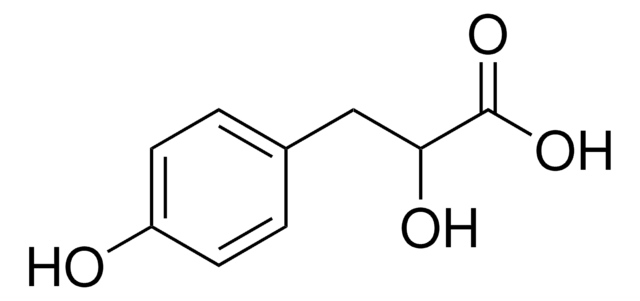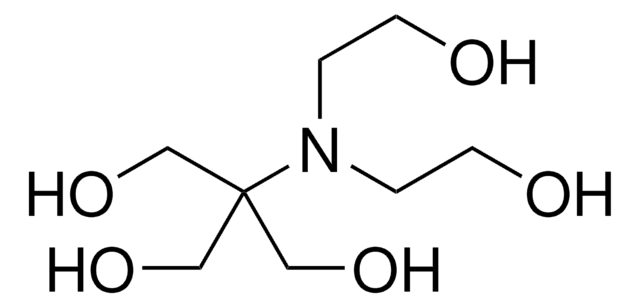H3375
HEPES
≥99.5% (titration)
Synonym(s):
4-(2-Hydroxyethyl)piperazine-1-ethanesulfonic acid, N-(2-Hydroxyethyl)piperazine-N′-(2-ethanesulfonic acid)
About This Item
Recommended Products
Assay
≥99.5% (titration)
form
crystalline powder
storage condition
dry at room temperature
technique(s)
cell culture | mammalian: suitable
color
white
pH
5.0-6.5 (25 °C, 238 g/L)
useful pH range
6.8-8.2
pKa (25 °C)
7.5
solubility
water: 500 mg/mL, clear, colorless
suitability
suitable for component for culture media
suitable for enzyme extraction
application(s)
diagnostic assay manufacturing
general analytical
life science and biopharma
pharmaceutical
SMILES string
OCCN1CCN(CC1)CCS(O)(=O)=O
InChI
1S/C8H18N2O4S/c11-7-5-9-1-3-10(4-2-9)6-8-15(12,13)14/h11H,1-8H2,(H,12,13,14)
InChI key
JKMHFZQWWAIEOD-UHFFFAOYSA-N
Looking for similar products? Visit Product Comparison Guide
Related Categories
General description
Widely utilized in cell culture, HEPES excels at maintaining physiological pH despite fluctuations in carbon dioxide concentration produced by cellular respiration, a feature not as prominent in bicarbonate buffers. It serves as an ampholytic separator for creating pH gradients in isoelectric focusing and exhibits less interference with DNA-restriction enzyme reactions compared to buffers with fewer substituted amine groups, such as Tris. Beyond these applications, HEPES may find application in various biological and biochemical studies, including immunoprecipitation, cell lysis, and live cell imaging. Its versatility makes it an indispensable tool in diverse research applications.
Application
- As a component in Danieau medium, which is used to prevent melanin pigment formation post gastrulation of zebra-fish embryo
- As a component of Hanks′ solution used in the degradation testing of Iron
- As a component of HEPES medium in the transfection of cell culture with plasmids
- Along with RPMI-1640, L-glutamine, FBS, Sodium pyruvate and β-mercaptoethanol for the culturing of rat insulinoma cells
- As a supplement in TCM199 medium for washing fresh oocytes required for nuclear transfer studies
Features and Benefits
- High purity product for biochemical and biological research
- Suitable for Cell culture
- Highly soluble in water with a useful pH range of 6.8 - 8.2 and pKa of 7.5 at 25 °C
Other Notes
Easily compare specifications for HEPES products with the HEPES specification table.
Legal Information
also commonly purchased with this product
Storage Class Code
11 - Combustible Solids
WGK
WGK 1
Flash Point(F)
Not applicable
Flash Point(C)
Not applicable
Personal Protective Equipment
Choose from one of the most recent versions:
Already Own This Product?
Find documentation for the products that you have recently purchased in the Document Library.
Customers Also Viewed
Articles
rganoid culture products to generate tissue and stem cell derived 3D brain, intestinal, gut, lung and cancer tumor organoid models.
Our team of scientists has experience in all areas of research including Life Science, Material Science, Chemical Synthesis, Chromatography, Analytical and many others.
Contact Technical Service







